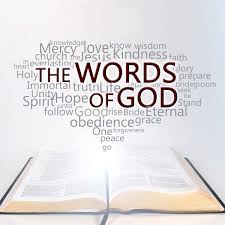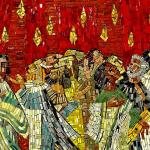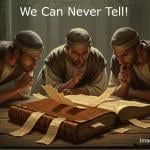I recently came across a great podcast called “The Bible for Normal People,” hosted by Peter Enns and Jared Byas. If those are not familiar names to you, the names of just a few the guests they have hosted over the past five years should be: Nadia Bolz-Weber, Richard Rohr, James Martin, Barbara Brown Taylor, Rachel Held Evans—these are just of the few guests I’ve heard so far.
I had a bike mishap on Saturday which produced thirty stitches over my right eye, so I’ve been binge-listening to the podcast during the hours when I would usually be binge-reading in the days after the end of a semester, including during the six hours I waited to get stitched up in the emergency room. I write about the Bible frequently in this blog; what I have been listening to reminds me of an essay I wrote a bit over a year ago.
Either the Bible is true or it isn’t, either it’s God’s inspired inerrant word or it isn’t, you can’t have it both ways, you can’t pick and choose to fit with whatever the latest fad or zeitgeist happens to be . . .
So claimed someone in a comment thread on a Patheos Progressive Christian Facebook page post recently. One thing I’ll say for Bible literalists: they aren’t a big fan of nuance. They like their truth to be . . . literal. Their world view is Manichean to the core. This or that. Black or white. True or false. Good or evil. No gray areas allowed.
This is the world I come from, and I find it difficult to just let it go when I see such comments, especially when I learned from other commenters that this particular commenter is a fundamentalist troll who loves to show up on progressive Christian pages and tell everyone that they are going to hell. So, of course I had to respond.
Me: The Bible is a book. A special one, but a book. Written by human beings, not dictated by God.
Him: You’re free to believe that, to reject the nearly 30% of prophecy that is STILL being played out today, but it does mean that you may not identify as a Christian.
Me: It means nothing of the sort. Millions of Christians do not believe that the Bible is the inerrant Word of God. What one believes about a book is not the litmus test for membership in the club.
Him: In THIS CLUB, yes it is. Rejecting the inerrancy of scripture is tantamount to rejecting the authority of God in your life, (A.K.A. Christianity) because you wish to be your own God and live for yourself, which is the very heart of so called progressivism (A.K.A SIN).
Me: It is sad to imagine a faith so narrow that it claims that God is confined within the covers of a book. That God somehow is incapable of speaking directly to contemporary human beings. That the Word of God is a book rather than a Person. God is brought into the world through human beings, not ancient texts.
I could have done better. I could have used the book this fellow worships to make my point as another participant in the conversation did succinctly:
John 1:1—In the beginning was the Word. John 1:14—And the Word was made flesh and dwelt among us . . . The Bible isn’t the Word of God, but it can lead us to the Word of God.
The Word is not a book, in other words. The Word is a Person.
Words have been a central focus of my life since my earliest memories. There have been few times in my life when a book was not within arm’s reach. My early years were full of apocryphal stories of how I learned to read. According to my mother, I was reading by age three without anyone having taught me how to do it. I was never without a book, and lined up my menagerie of stuffed animals on the couch to read to them. I knew how to read before I could tell time or tie my shoes—perhaps my parents should have provided me with instruction manuals to read.
In Ali Smith’s Autumn, the elderly Daniel Gluck frequently asks Elizabeth, the young woman next door who becomes his best friend, what she is reading. It becomes clear that his question has to do with more than “what book are you into right now?”
Always be reading something, he said. Even when we’re not physically reading. How else will we read the world?
Daniel’s question reminds me of something I came across from Simone Weil as I am reviewing some of her essays for a new course that I’ll be teaching in the fall:
There is a mystery in reading, a mystery which, if we contemplate it, may well help us, not to explain, but to grab hold of other mysteries in human life. . . The sky, the seas, the sun, the stars, human beings, everything that surrounds us is something that we read.
Reading is more than deciphering words on a page. I was jerked up short a few years ago when I read in a book by theologian Patrick Henry that “God died because people forgot how to read.” Henry’s claim, as Simone Weil’s above, incorporates a much broader understanding of “reading” than our traditional Western conception, which considers reading to be an exclusively cognitive, intellectual, and mental activity—precisely the sort of activity I’ve spent the majority of my waking hours on this planet doing.
So how is it that such a crucial, human defining activity as reading could be forgotten, even to the point of emptying the divine of content? The problem is not with reading per se—it’s that we’ve forgotten that reading is not just an intellectual activity. God’s death is not due to a misuse of or over-reliance on the activity of reading. It’s due to forgetting what true reading even is.
I had heard about “lectio divina,” sacred reading, before I went on sabbatical to a Benedictine college campus with a large abbey on site a decade ago, but it had not struck me as a particularly interesting concept. Just another skill to learn, technique to master, perhaps—but really, I thought, if there’s one thing I know how to do pretty well, its reading. After several weeks of daily prayer with the abbey monks, it dawned on me that lectio divina isn’t about words and meaning and retention at all.
I often found that I did not remember, even for the amount of time it took to walk from the choir stalls to the front of the abbey and exit, which Psalms we had read nor any of the content. Yet I had a sense that what we were doing was far more important than reading a book, marking it with highlighter and pen in my usual method, and perhaps memorizing a phrase or two for future reference in class or conversation.
What was happening in the choir stalls was not a mind event, but a full body experience bypassing my overdeveloped mind and seeping into all the other parts of me that had been starved for years. My bodily rhythms, my intuitions, my emotions, my spirit. The Psalms speak of God’s word all the time, but almost never of thinking about God’s word.
It’s more like what Jeremiah reports: “Your words were found and I did eat them, and your word was for me the joy and rejoicing of my heart.” Simone Weil was channeling her internal Jeremiah when she wrote that “I only read what I am hungry for at the moment when I have an appetite for it, and then I do not read, I eat.” And like a mother bird regurgitating food for the babies, an important word or phrase would come into my consciousness later in the day, one that I didn’t remember reading but which had seeped into my soul.
In our “real world” of immediacy, getting it done, making money and a living, is there a place for what I began to absorb in a monastery abbey in the middle-of-nowhere Minnesota? Over the subsequent years I’ve seen small but important evidence of change in how I converse with people, how I approach the day, and a heightened and more immediate sense of when a layer is threatening to grow back over my divine reading space.
Learning how to read differently is not just another technique; because it is a new way of being, it is transferable to everything. I went on sabbatical expecting to write about trying to sustain a life of faith when God at best is a silent partner who never writes, calls, emails, texts or tweets. Now the divine is everywhere and seems to have a lot to say. Reading the divine begins with believing that everything is sacramental, infused with the breath of God, with taking “the Word became flesh” very seriously. All of creation is a sacred text. What are you reading?













